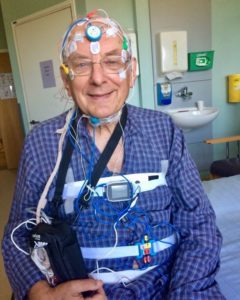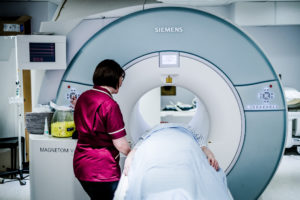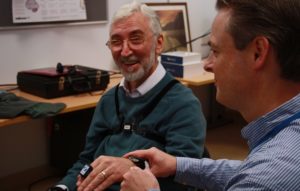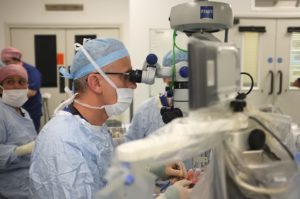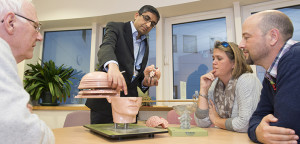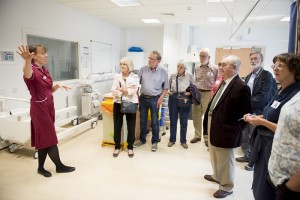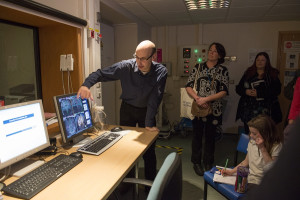People across the South East of England are to be given access to a new digital treatment for insomnia as an alternative to sleeping pills. The Sleepio app, a digital cognitive behavioural therapy (CBT)-based programme that can be accessed via smartphone or the web, is to be made available later ... READ MORE
News for Preventive Neurology
New research on recovery following intensive care treatment
Out-of-hours discharge from intensive care is strongly associated with both in-hospital death and ICU readmission, according to a study supported by the NIHR Oxford Biomedical Research Centre. The systematic review and meta-analysis by researchers from the University of Oxford’s Nuffield ... READ MORE
One dose of aspirin doesn’t fit all
About one billion people worldwide take regular aspirin, usually to prevent heart attacks or strokes. Writing in The Lancet, researchers have shown that ‘one-dose-fits-all’ use of aspirin to prevent heart attacks, stroke or cancer, is ineffective or harmful in the majority of people, and that a ... READ MORE
More awareness needed about stroke risk after mini-stroke, study finds
A leading Oxford stroke specialist says more needs to be done to raise of awareness of the need to take rapid action after a mini-stroke in order to reduce the number of major strokes. The study of more than 2,200 patients across Oxfordshire was led by Prof Peter Rothwell (right), of the Nuffield ... READ MORE
Study launched to investigate link between sleep problems and Parkinson’s
Researchers in the Oxford Parkinson’s Disease Centre have launched a new five-year study looking at the links between a condition known as Rapid Eye Movement Sleep Behaviour Disorder (RBD) and Parkinson’s. Supported by the NIHR Oxford Biomedical Research Centre, the study seeks to improve the ... READ MORE
Oxford medical researchers win prestigious national awards
Leading health researchers in Oxford have been recognised in a prestigious national competition. Eight professors have been named National Institute of Health Research (NIHR) Senior Investigators in recognition of their “outstanding contribution to clinical and applied health and social care ... READ MORE
Oxford researchers develop new scan to predict stroke
Researchers at the University of Oxford, supported by the NIHR Oxford Biomedical Research Centre, have developed a new type of MRI scan to predict the risk of having a stroke. The non-invasive technique, developed with funding from the British Heart Foundation (BHF), is described in a paper ... READ MORE
A breathless and magical experience for foreign students
The NIHR Oxford Biomedical Research Centre has welcomed students attending the 58th London International Youth Science Forum, a two-week residential event that attracts more than 500 of the world’s leading young scientists from more than 75 countries. Twenty-five students attended the Nuffield ... READ MORE
Record high for Oxford University Hospitals research studies
The number of medical research studies at Oxford University Hospitals NHS Foundation Trust has hit a record high, new figures show. The number of studies active in May 2016 was 1,786, up seven per cent from 1,664 in May 2015. The figures – up 222 per cent from 554 in May 2008 – ... READ MORE
World first for robot eye operation
Surgeons at Oxford’s John Radcliffe Hospital have performed the world’s first operation inside the eye using a robot. Robert MacLaren, Professor of Ophthalmology assisted by Dr Thomas Edwards, Nuffield Medical Fellow, used the remotely controlled robot to lift a membrane 100th of a millimetre ... READ MORE
Unique Oxford study of vascular disease welcomes 10,000th participant
Peter Casey was the study's 10,000th patient The only project of its kind anywhere that studies all acute vascular events, such as strokes and heart attacks, to develop better treatments has recruited its 10,000th Oxfordshire ... READ MORE
Students learn about John Radcliffe brain research
Students pursuing a career in science and medicine visited Oxford’s John Radcliffe Hospital in an event supported by the NIHR Oxford Biomedical Research Centre (BRC). A total 24 students aged 16 to 32 attended talks and interactive sessions on BRC-supported research by the University of Oxford on ... READ MORE
High blood pressure linked to vascular dementia
High blood pressure could significantly raise the risk of developing the second most common form of dementia, according to a new study from The George Institute for Global Health. The medical records of more than four million people were analysed with researchers finding heightened blood pressure ... READ MORE
New tool to improve blood pressure measurement
Scientists at Oxford University have developed a new way of estimating our true underlying blood pressure that overcomes common problems in a clinical setting which can lead to misleading results. Blood pressure measurement is frequently used by medics to understand our health, and dangerously ... READ MORE
Electrical brain stimulation could support stroke recovery
Applying an electric current to the brain can help recovery from stroke, Oxford University researchers at the John Radcliffe Hospital have found. A team from Oxford’s Nuffield Department of Clinical Neurosciences, led by Professor Heidi Johansen-Berg and Dr Charlotte Stagg, studied the use of ... READ MORE
Blind woman’s joy as she reads the time thanks to “bionic eye”
A patient who is the first in the UK to receive the world’s most advanced “bionic eye” has been able to read the time for the first time in more than five years. The moment Rhian Lewis, 49, realised she had correctly told the time is captured on BBC’s “Trust Me I’m A Doctor”, to be broadcast on ... READ MORE
Oxford Brain Tumour Open Day 2015
On 11 November 2015, there was an open day at the John Radcliffe Hospital for brain tumour patients and carers. The aim was to show what clinical researchers in Oxford are doing to improve diagnosis and care. The event was organised in partnership between the Nuffield Department of Clinical ... READ MORE
Visitors learn about brain research
Visitors to Oxford’s John Radcliffe Hospital learned how blood flows to and around the brain during a tour of medical facilities. The Friday, September 11 tours were part of the Oxford Open Doors programme of events, where city institutions opened to the public. Friday’s two free tours – which ... READ MORE
Sleep deprivation could reduce intrusive memories of trauma
A good night’s sleep has long been recommended to those who have experienced a traumatic event but an Oxford University-led study provides preliminary experimental work suggesting it could actually be the wrong thing to do. Sleep deprivation might prevent people from consolidating memories of ... READ MORE
John Radcliffe visitors see the brain in action
VISITORS and pupils learned how staff at the John Radcliffe Hospital study the brain as part of a series of public events about medical research in Oxfordshire. More than 100 people enjoyed a tour of the Oxford University Centre for Functional MRI of the Brain (FMRIB) on Monday March 16. They ... READ MORE




